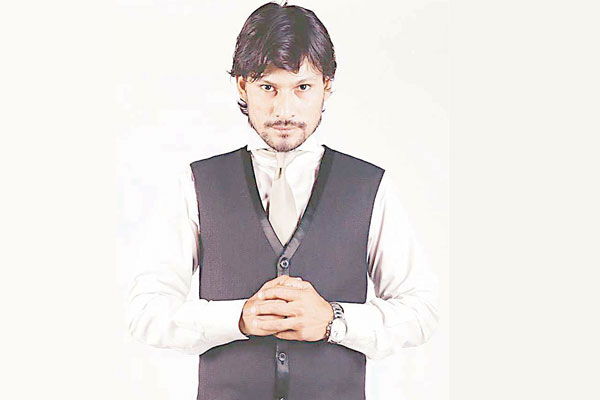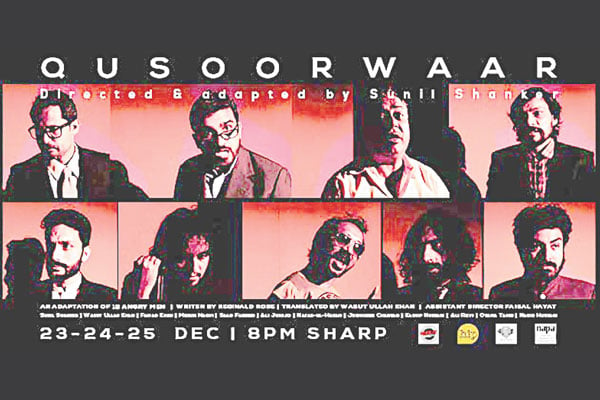One doesn’t necessarily have to be a fan of the novelist John Grisham or the American TV series Suits to enjoy Napa’s recent theatre production, Qasoorwaar. That said, if you are one, that’s simply a bonus.
Qasoorwaar is the story of a 12-member jury, comprising 11 men and 1 woman, as they deliberate over a first degree murder case.
instepreview
The courtroom drama is pertinent to the times we live in.
Karachi: One doesn’t necessarily have to be a fan of the novelist John Grisham or the American TV series Suits to enjoy Napa’s recent theatre production, Qasoorwaar. That said, if you are one, that’s simply a bonus.
Directed by Sunil Shanker, Qasoorwaar has been adapted from a 1957 Hollywood film called 12 Angry Men and first premiered during the inaugural edition of Karachi Theatre Festival, which was held in November of last year.

Aside from handling direction duties, the multi-talented Sunil Shanker plays a significant character in Qasoorwaar.
Upon receiving tremendous response from the public, the play was staged again in the last week of December 2016 at the Napa auditorium.
Sidney Lumet’s courtroom drama, 12 Angry Men, was released in 1957 and recreating the same thrill after six decades on stage in Pakistan, was surely a daunting task but one that the crew and cast managed with aplomb.
Qasoorwaar is the story of a 12-member jury (which includes 11 men and 1 woman) as they deliberate over a first degree murder case. The defendant is an 18-year-old young man who is accused of stabbing his father to death. The case appears to be simple, open and shut with an eyewitness, who claims to have witnessed the entire murder. Another witness recalls hearing screams, footsteps and seeing a shadow.
Meanwhile, to make matters worse, a weapon similar to the murder weapon is recovered from the defendant whose alibi is also thin. The doubt comes from juror number 8, the only woman on the jury, who does not believe that the defendant is guilty.

Essayed by Joshinder Chaggar, the presence of this dilemma adds layers of conflict to proceedings. As each juror, one after the other, attempts to shake her doubt, she uses logic and common sense to dissuade their own belief(s). Consequently, one after the other, each juror is moved to changing his vote from guilty to not guilty.
Within those two hours, the audience in attendance had the chance to gain insight into all the 12 jurors including their emotional state, financial realities and how their minds processed information, making it possible to empathize with them. Any production that can create such a strong visceral response is certainly worthy of exploration.
Aside from handling direction duties, the multi-talented Sunil Shanker plays a significant character in the play, namely that of a loud garage owner. Fawad Khan’s portrayal of a distraught father and Mesum Naqvi’s rational stockbroker (along with Shanker’s portrayal) made for the best performances from the lot. Ditto for Wasut Ullah Khan who adapted the play and also features in the cast.
Others who made a strong impression include Saad Fareedi, Ali Rizvi and Osama Tahir while Nazar ul Hasan also stood out, not just because of his spontaneity, but also because he provided the much needed comic relief to proceedings.
Unfortunately, Joshinder Chaggar’s character, though strong, lacked impact because the dialogues were not as commanding as one had hoped.
In this fast-paced age, it was a tough prospect to keep the audience engaged for two hours but the performances made the probability a possibility.
In the end, despite the play’ serious undertones, it managed to keep the audience engaged and entertained while Napa’s legacy of bringing quality theatre to Karachi - be it in the form of original scripts or adaptations – also remains intact.